What to See in Hallstatt, Austria: 10 Unmissable Places You’ll Actually Love

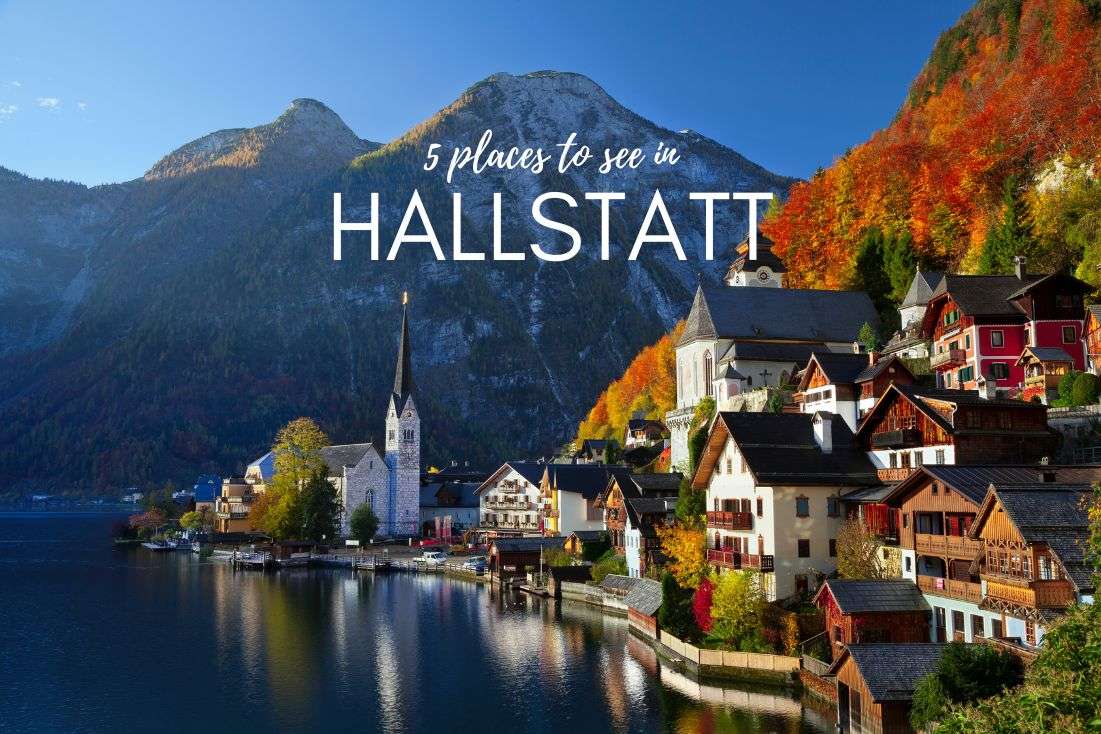
Wondering what to see in Hallstatt? You’re not the only one—this little Austrian lakeside village is often called “the prettiest in Austria” and draws in millions of visitors every year. Hallstatt is my favorite town in Austria.
But what’s actually worth seeing once you’re there? Sure, you can’t miss the dramatic mountains mirrored in lake and houses that look like they’ve been curated just for tourists… But I’ll walk you through the top 10 places to visit in Hallstatt—covering the must-sees like dramatic viewpoints, ancient salt mines, and a couple of creepy surprises. And yes, my brutally honest opinions and personal experiences at each place.
If you’re planning a short visit, this guide will help you hit the highlights fast. And if you’ve got more time or just want to see something different, I’ve included a bonus section of extra spots in Hallstatt and even a few nearby places worth adding to your itinerary.
Want the full trip laid out? Check out my Itinerary for one day in Hallstatt with hotel recommendations, step-by-step plans, and tips on how to dodge the worst of the crowds.
Or, read more about visiting Austria and add more things to your bucket list.
Quick list: What to see in Hallstatt
My top 5 unmissable places:
- Hallstatt Skywalk & iconic lake view
- Salzwelten Salt Mine
- Dachstein 5 Fingers
- Hallstatt Ossuary
- Hallstatt museum & hidden excavations
Got more time? Here are 5 more things to see and do:
- Visit the Evangelical Church & Market Square
- Find the best photo spots
- Go to the small shops with salt-based souvenirs
- Walk along the lakefront path
- Take a lake ferry ride
Sometimes, all you need to do is take the first step... I've filtered out the best hotels in Austria for you
Save it for yourself to come back to later, or share with your friends on social media!
Map of the top things to see in Hallstatt
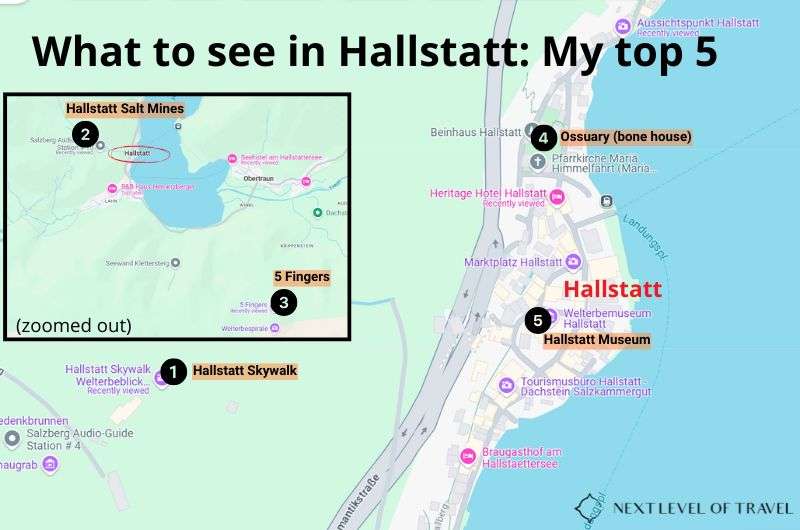
Hallstatt has plenty of exciting places to see… here are my top 5 that you absolutely cannot miss
What is Hallstatt known for?
Hallstatt is—plain and simple—painfully photogenic. The end. That’s it—a pastel-perfect village clinging to the edge of a glassy lake, framed by dramatic Alpine peaks. It’s known for its iconic postcard view, its UNESCO World Heritage status, and for somehow looking too perfect to be real. Oh, and salt. It sits above the oldest salt mine in the world, which is the reason Hallstatt exists in the first place. So yes, it’s a fairytale town—built on salt and now held up by smartphones.

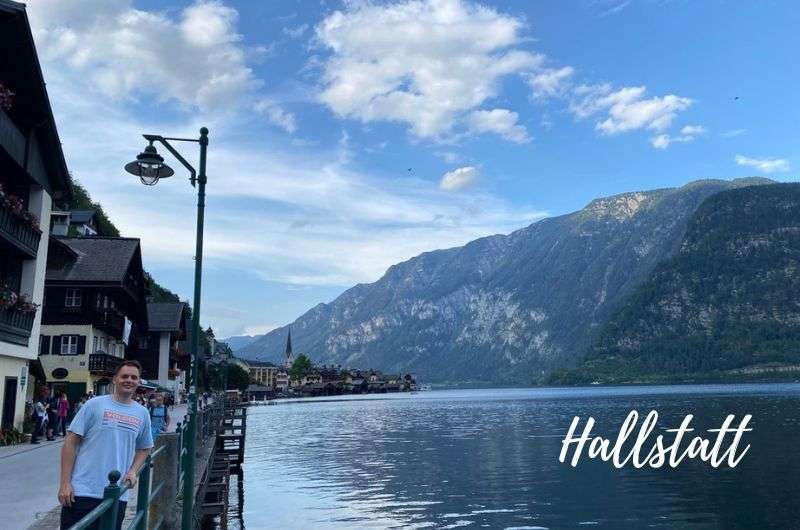
Hallstatt—the fairytale village that’s worth braving the crowds for
My experience in Hallstatt
The first time I visited Hallstatt was during the pandemic, when the world was shut down and Hallstatt was blissfully empty.
When I returned in 2024, Hallstatt was flooded with day-trippers, bus tours, and people standing exactly where you want to take your photo. I hate crowds, and I normally avoid places like this. But I’ll make an exception for Hallstatt.
To me, the village feels like someone designed it for a fairy tale, then accidentally dropped it into the Austrian Alps and let people believe it’s a real place. Don’t get me wrong—parking is a nightmare and even I don’t have a secret recipe for that (be the first one there?), but it’s all worth it when you catch that first glimpse of the lake and rooftops.
This guide is what I wish I had the first time—a no-fluff list of the very best things to see, plus tips to make your trip a lot smoother.
Pro tip: I strongly recommend booking a room in Hallstatt to beat the day trippers and see the town when it’s slightly less overrun. I can’t tell you how perfect it is to wake up early and get a slice of Hallstatt to yourself.
My Hallstatt hotel recommendations:
My favorite place to stay is in the next village over (what can I say, I really prefer a more peaceful atmosphere!), but it’s a dream: COOEE Alpin Hotel Dachstein. Breakfast with a view, anyone?
If you want to sleep right in Hallstatt, go for Boutiquehotel Strand Hallstatt. The setting directly on the lake’s shore couldn’t be better, and it steers clear of tacky Austrian decor.
Now, let’s get into the highlights:
1. Hallstatt Skywalk for THAT epic lake view (World Heritage View)
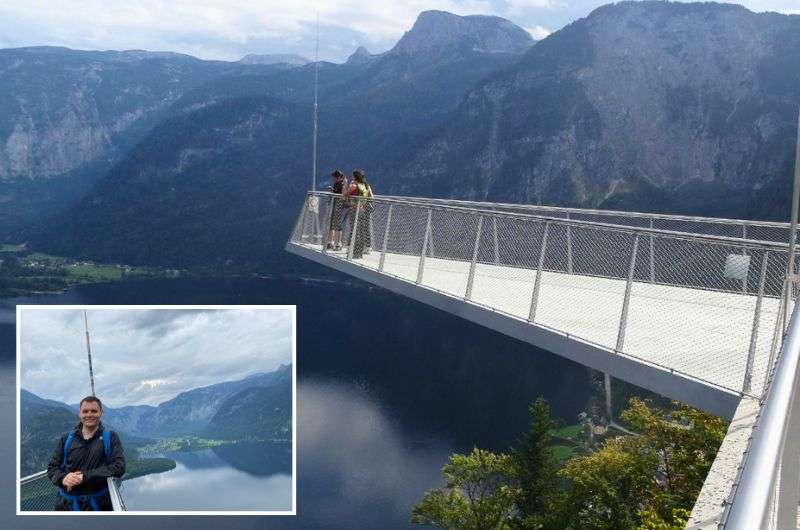
Beautiful views from the Hallstatt Skywalk
If you're wondering what to see in Hallstatt, this is the unmissable number one spot. While the Hallstatt Skywalk’s not my personal favorite viewpoint, there’s no denying it’s the Hallstatt photo op—so I’ve very graciously given it the top ranking.
Austrians are clearly obsessed with viewing platforms hanging over empty space, but I admit, the scenery here is absolutely breathtaking.
Why it’s special
The Hallstatt Skywalk—officially called Welterbeblick, or “World Heritage View”—is a 40-meter-long steel platform that juts out over a 360-meter cliff right above the town. It offers a ridiculous panoramic view of Hallstatt, the lake, and the surrounding Dachstein mountains.
You can reach it on foot if you're into uphill climbs, but most people take the Salzbergbahn funicular. Once you arrive, cross the suspension bridge to Rudolf’s Tower (which looks more like a villa than a tower, but sure), and the Skywalk is right beneath it.
Ironically, it may be even more impressive in foggy and rainy weather. It gives this UNESCO view a mysterious and mythical vibe.
From there, you can follow the “Path through time”, a short trail with info panels about Hallstatt’s burial grounds and salt mining history.
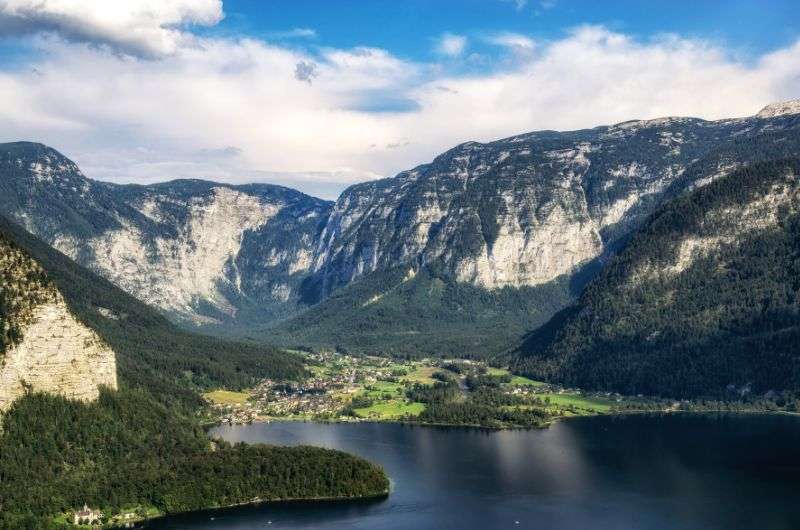
Like in a fairytale
2. Salzwelten, Hallstatt’s Salt Mines: The world’s oldest with underground slides
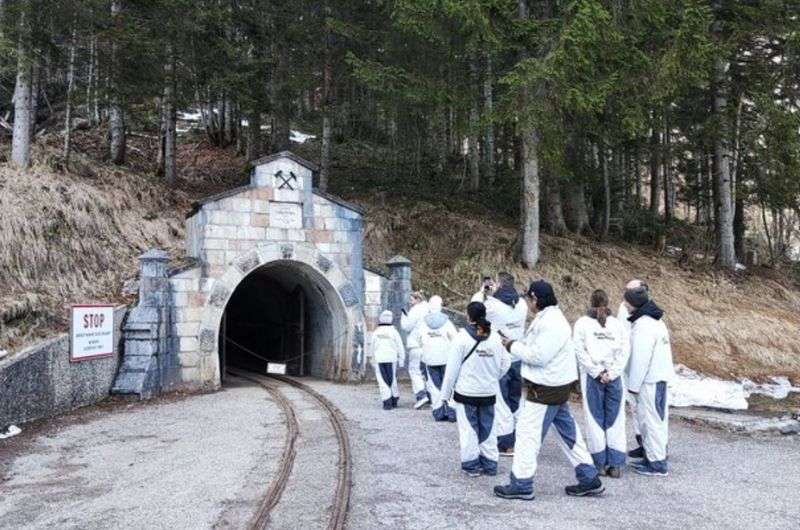
Hallstatt’s salt mine tour starts with a stylish suit-up
Update: From September 2025, the salt mines will be closed for renovation.
The salt mine is definitely the most memorable attraction in Hallstatt in my book.
Why it’s special
The Hallstatt Salt Mines are the oldest in the world, with a 7,000-year history. This “white gold” was so essential for the development of this region that they named it after it. Salz means salt in German; therefore, the Salzkammergut region, the city of Salzburg, or Salzberg Mountain (berg meaning mountain and burg meaning castle). But back to the mine.
My experience
The tour begins with a train ride inside the caves, which is an exciting experience in itself. We got helmets and raincoats and rode through very narrow spaces for about a kilometer (0.60 mi) down to the heart of the mine.
There, we came across the oldest wooden staircase, used by miners almost 3,000 years ago. Then the tour continued with a 2 km (1.3 mi) long exhibition and archeological excavations.
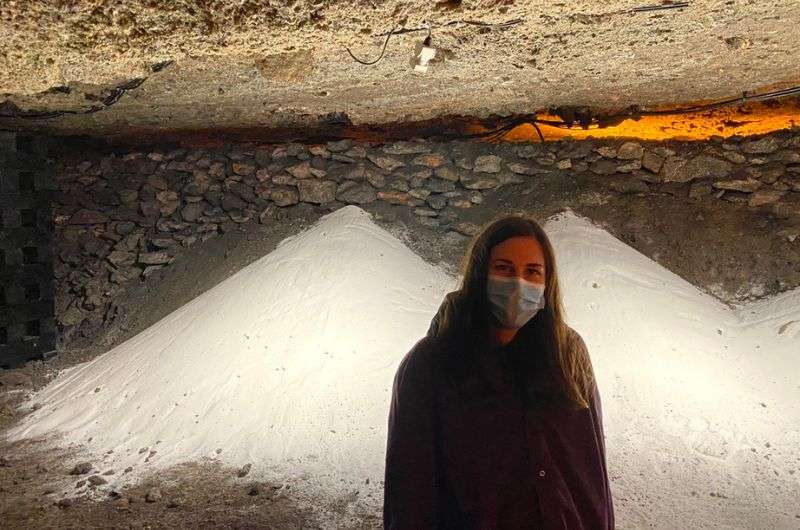
Touring the Hallstatt Salt Mine
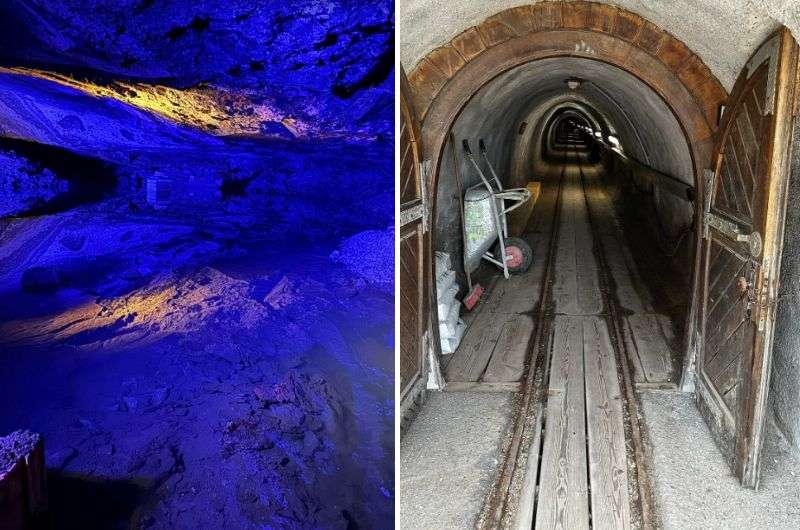
The tunnel that takes you deep into Hallstatt’s ancient salt mine, where thousands of years of history (and some dramatic lighting) await
The most bizarre and super fun thing we did was slide down between the individual floors of the mines using the long wooden slides. I felt a bit like in the dwarf mine in Lord of the Rings, but it was thrilling and educational. Seriously, I even ranked the salt mines one of my top things to do in Austria.
Pro tip: Wear warm clothes and sturdy shoes for the visit. The temperature inside the mine is around 8°C (46°F), and the tour takes 90 minutes.
Practical info:
- Open 9:30 to 4:00 pm from April to October, will be closed for renovation from September 2025
- Tickets cost EUR 43 and include the salt mines and cable car round trip
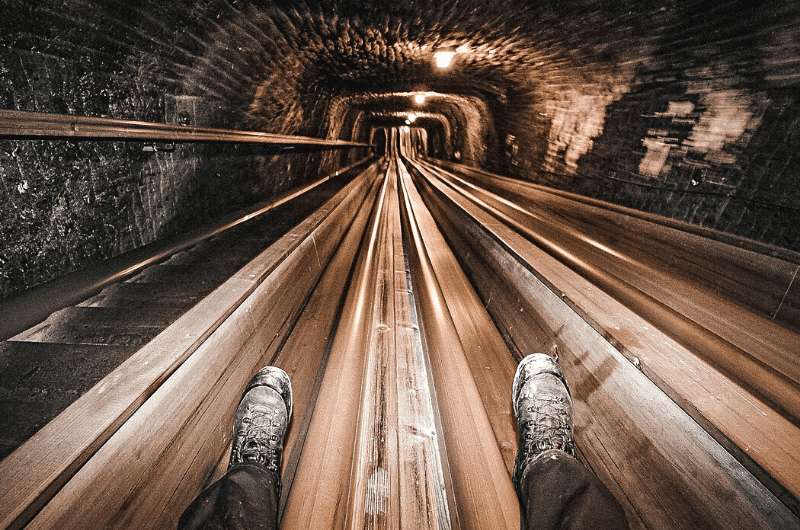
Sliding through history—literally... It’s cold, it’s weird, it’s one of the best things I've done in Austria
3. Dachstein Ice Caves & 5 Fingers: Most panoramic platform near Hallstatt
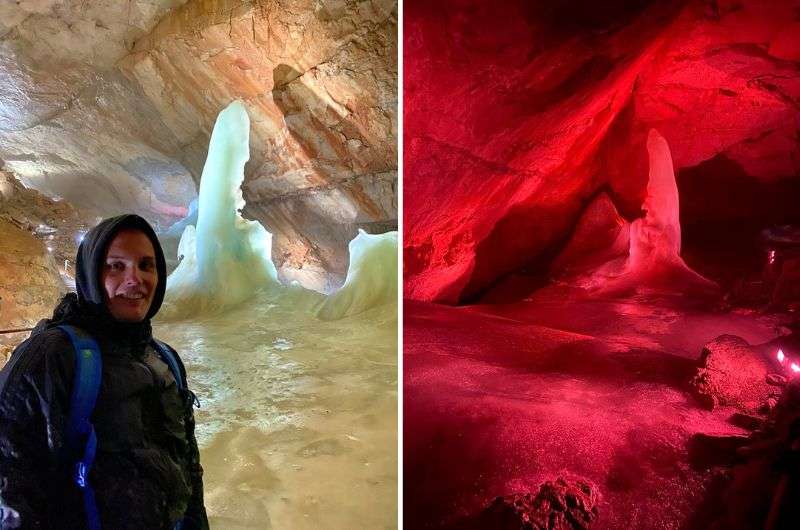
Not technically Hallstatt—but close by, frozen, and jaw-droppingly cool @ Dachstein Ice Caves
Not technically in Hallstatt, but close enough and cool enough to earn an undisputable spot in my top 5 things to see in Hallstatt.
The entire region of Hallstatt-Dachstein/Salzkammergut is on UNESCO's list as a cultural landscape, so there’s a lot to explore. As you may already know, if you've read some of my other articles, I hate crowds and I prefer nature to big cities. But Hallstatt is a tourist mecca in most parts of the year, gets crowded as heck (with impossible parking, may I add), so I suggest running to the hills. Literally.
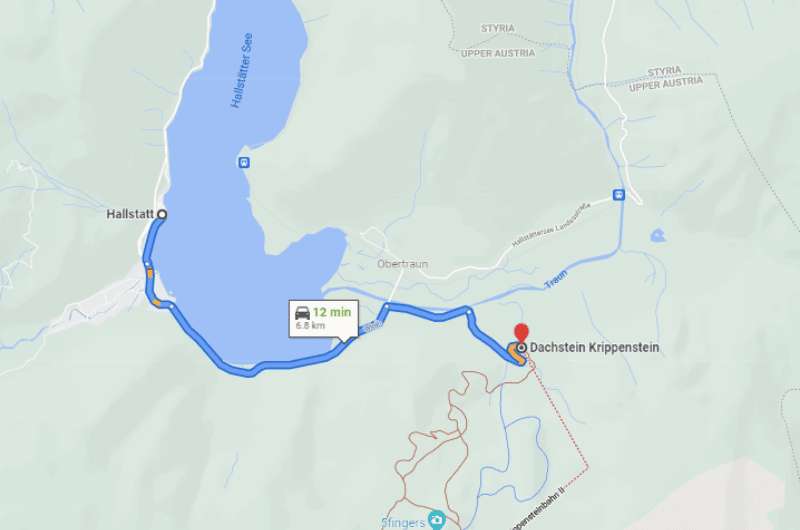
Route from Hallstatt to Krippenstein Ski Resort parking
Dachstein Caves
Just across the lake in Obertraun lies the Dachstein cave complex, nestled in the Krippenstein mountains (also a ski resort in winter). You can explore:
-
The Mammut cave—one of the world’s largest karst caves
-
The Koppenbrüller cave—complete with an underground river
-
The Giant Ice Cave—with otherworldly frozen formations
Roam the caves and sink into the mysterious atmosphere of the underground kingdom. I loved it.
Practical tips:
-
Opening times depend on the cable car, which runs every 15 minutes
-
Check current hours and prices at the official site (www.dachstein-salzkammergut.com)
-
Park for free at Krippenstein cable car parking lot, then ride up by cable car
Read details about all 3 caves and my reviews of them in my Visiting Dachstein from Hallstatt guide.
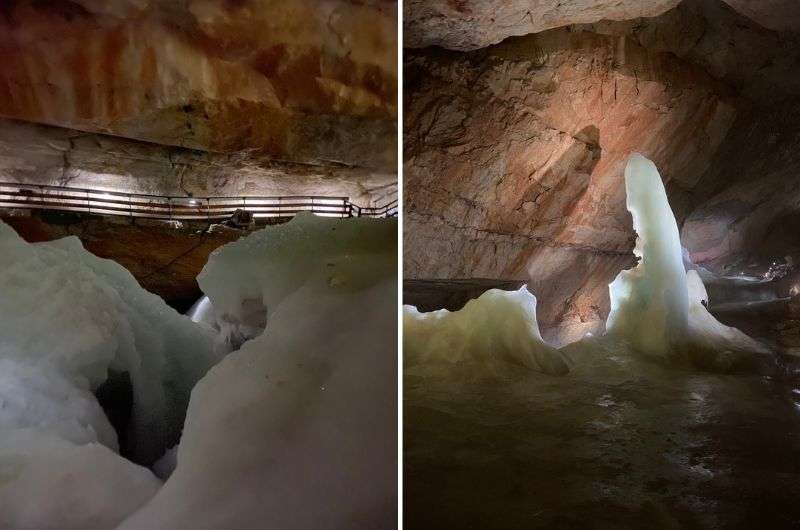
Bring a jacket—it’s chilly, but the views are fire!
5 Fingers viewing platform
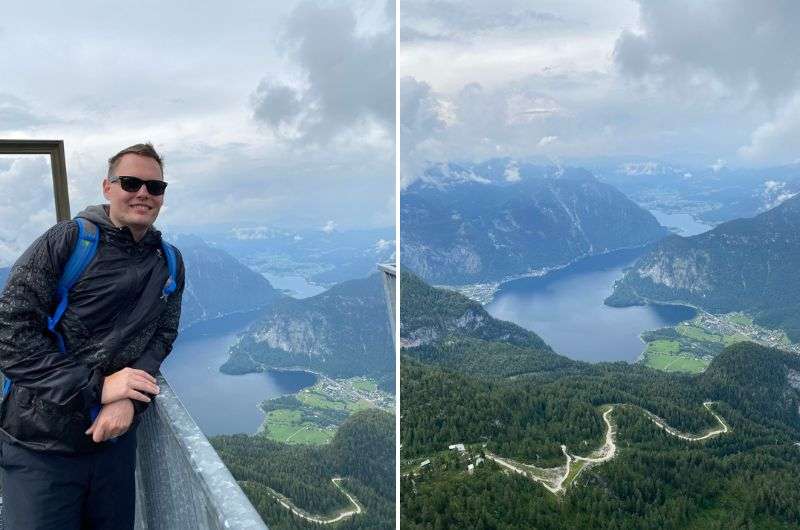
What a beautiful view...and the 5fingers
Once you’re done exploring the caves, hop back on the cable car (or hike if you’re feeling strong) and continue up to the 5 Fingers, the most dramatic panoramic platform near Hallstatt.
Located over a 400 m (1,312 ft) drop near the top of Krippenstein mountain, there are 5 different viewing platforms (hence the “5 fingers”).
Here’s what to expect:
-
Why the name? The platform has five separate metal walkways (“fingers”) jutting out over the cliff—each one with a different design and experience (glass floors, a photo frame, etc.)
-
Arguably the best view in the area. You can see Hallstatt, the lake (Hallstättersee), and the mountain range.
-
Pro tip: Even if it's cloudy or foggy, the atmosphere is often even more magical.
-
Keep going: Just beyond the Fingers is the Welterbespirale, a spiral-shaped viewing platform at 2,100 m (6,890 ft) with a 360° view of the entire UNESCO region.
-
Feel like hiking? There are marked trails connecting the viewpoints if you want to escape the cable car crowds for a while.
4. Hallstatt Ossuary: The eeriest place to visit

Hallstatt’s Ossuary is eerie, intimate, and deeply human—over 600 hand-painted skulls resting in a tiny chapel above the village
Speaking of rainy days, here’s your chance to get properly creeped out. Located on the hill above Hallstatt village, the Catholic Church of the Assumption of Our Lady watches over a tiny cemetery. And I do mean tiny—which is why Hallstatt, like many old European towns, solved the space issue with an ossuary (aka a bonehouse). Clever, right?
The small St. Michael’s Chapel, tucked right next to the cemetery, houses what the locals call the Beinhaus ("bone house").
Why it’s special
-
Over 1,200 human skulls, about 600 of them hand-painted with names, symbols, and floral designs.
-
Small but fascinating, especially if you've seen larger ossuaries like Kutná Hora in the Czechia or the Paris Catacombs in France.
-
The tradition behind it is that once someone’s buried for a while, their bones are moved here, and residents can even request custom decoration styles.
Practical info:
-
Open May to September daily from 10 am to 6 pm, October daily from 10 am to 5 pm, November to April only Wednesdays to Sundays 11:30 am to 3:30 pm
-
Tickets cost EUR 2
You may have seen the Catacombs of Paris or the Ossuary in Kutná Hora in the Czech Republic. The Hallstatt ossuary is quite small compared to those, but they took it to another level by painting designs on the skulls. In the Beinhaus (as the locals call it), there are more than 1,200 skulls and around 600 of these are hand-painted with names and ornaments on it. Because all the residents are familiar with this necessary custom, they can express their wishes regarding the design and style once they’re to be moved from the grave to the ossuary.
- Open May to September daily from 10 am to 6 pm, October daily from 10 am to 7 pm, November to April just Wednesdays to Sundays 11:30 am to 3:30 pm
- Tickets cost EUR 2

This is my idea of a nightmare… being stuck in a crowd even after I die!
5. World Heritage Museum Hallstatt & Hidden Excavations
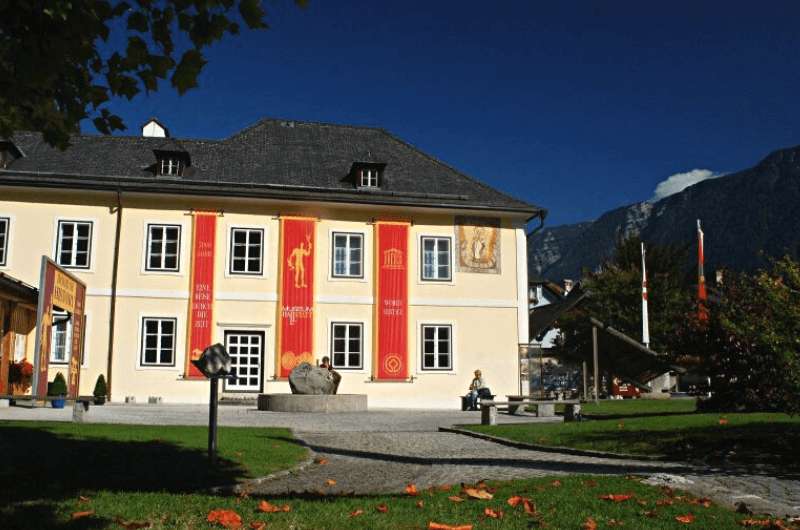
Welterbemuseum Hallstatt
Hallstatt's rich history is deeply intertwined with salt mining, dating back over 7,000 years—making these mines older than the Egyptian pyramids! And that’s something worth learning more about.
World Heritage Museum Hallstatt
In the World Heritage Museum Hallstatt (Welterbemuseum Hallstatt), you can explore the artefacts from ancient history all the way up to more recent history. The interactive exhibition leads you through the ancient way of living to geological facts about the area.
Is it worth it?
Don’t expect cutting-edge technology, but it provides a comprehensive overview of Hallstatt's cultural significance and is a worthwhile place to visit, especially for rainy days.
Tip: Don’t even think of booking your ticket in advance. The official website of the museum is approximately the same age as the mines, and only in German. At least I translated the öffnungszeiten and eintrittspreise for you. Call me a fairy godmother.
Practical info:
-
Opening times: May to September: 10 am to 6 pm daily, April and October 10 am to 4 pm, November to March: 11:30 am to 3:30 pm Wednesdays to Sundays only
-
Tickets cost EUR 12
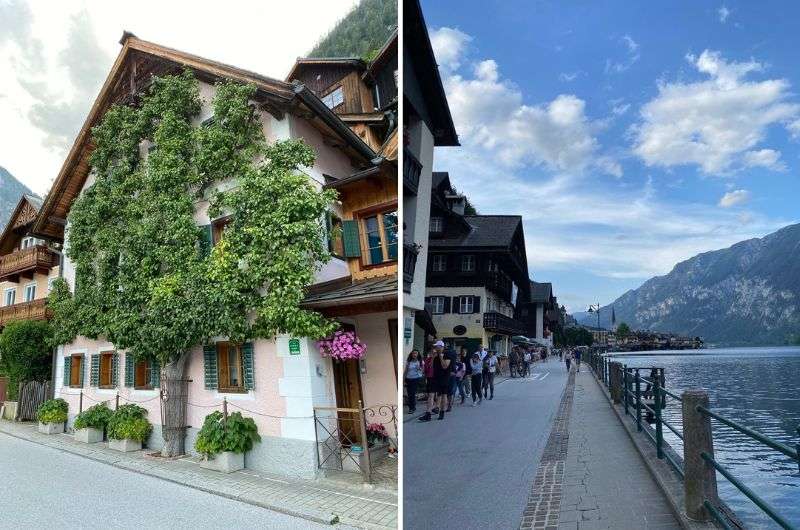
Visit Hallstatt early for a chance of lakeside peace
Hidden gem in Hallstatt: Archeological Excavations
Just a few steps from the Hallstatt Museum, across the little square, is a sports equipment store. And no, I’m not telling you to go buy new running shoes.
Get this: There’s an excavation site under the store which is freely accessible! It was discovered by accident when the owner of the house wanted to build a boiler room under the store. The archeologists and students from the University of Vienna were summoned to explore the site and you can imagine my surprise when it really was possible to just go and see a number of excavation pieces and ancient walls from different parts of Hallstatt's rich history.
Practical info:
- Open daily from 9 am to 6 pm
- Free entry

Got more time? Other places to see in Hallstatt
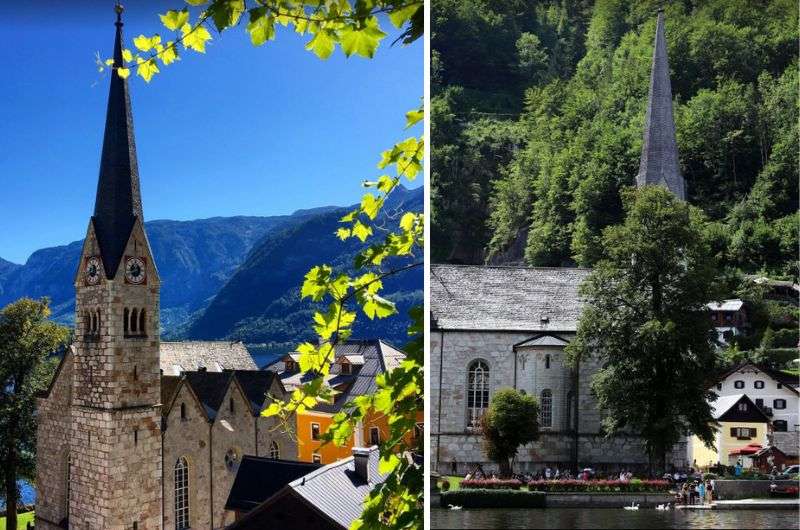
Evangelical Church in Hallstatt
Do you have extra time? Not interested in heading to the mountains? Here are a few more places in Hallstatt that’ll keep you busy:
-
Evangelical Church & Market Square—The iconic steeple, plus a charming little square with cafés and benches. You can’t not see it on your visit and Hallstatt wouldn’t be the same without it!
-
Best photo spot—Walk 5 minutes north of the ferry dock for a classic Hallstatt lake-and-mountain shot (you’ll know it when you see it).
-
Small shops with salt-based souvenirs—Yes, it’s touristy. But it’s kind of cute, right? Grab a salt scrub or salt chocolate for the whole family back home (with extra chocolate for yourself).
-
Walk along the lakefront path—Take a stroll past the town’s southern edge along Seestrasse—it’s panoramic, peaceful, and surprisingly empty—if you go far enough.
-
Lake ferry ride or boat rental—I opted for renting my own little electric boat and not be crowded on a ferry; either way, this will possibly the prettiest boat ride of your life! The ferry goes year-round, but only in summer do they do a proper touristy round-trip (EUR 18). It’s always possible to buy a ticket to the train station and back and make your own little sightseeing trip that way (EUR 4 and 10 minutes one way). Sit on the upper deck for best views.
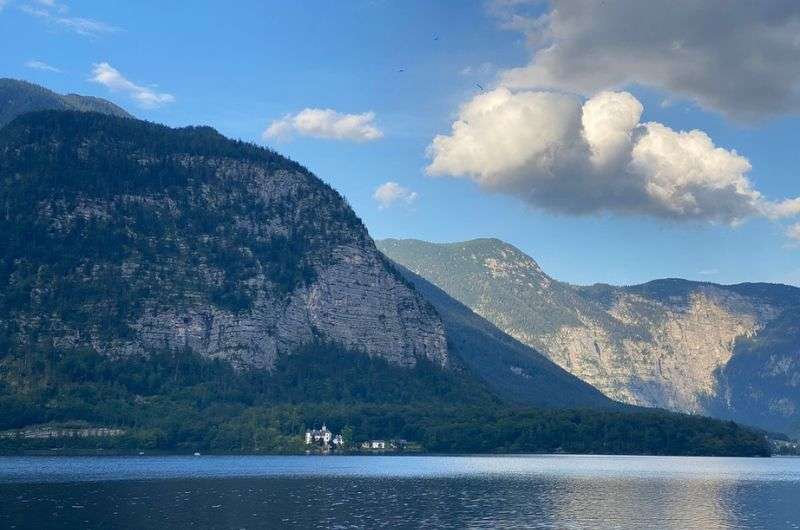
View across the lake from Hallstatt to Grub Castle
Bonus: Nearby places to visit from Hallstatt (if you’re staying longer or exploring the Dachstein region)
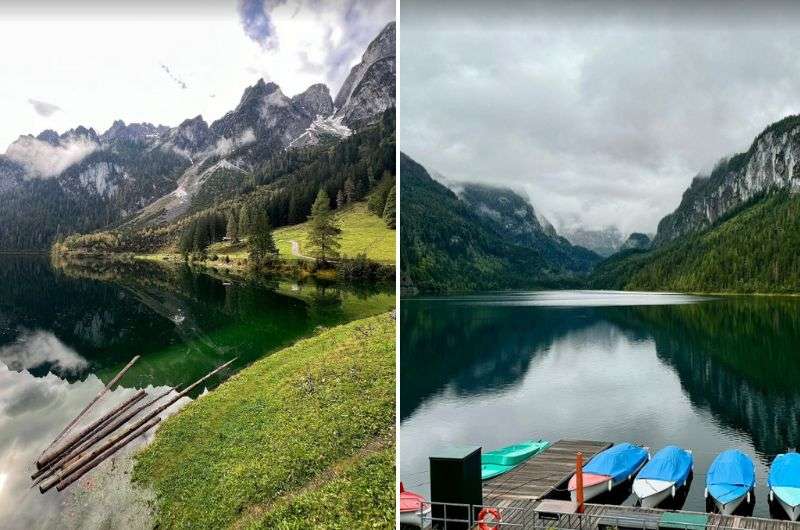
Gosausee: glacier views, waterfall vibes, and no crowds. One of the region’s best-kept (and most beautiful) secrets
-
Gosausee—A glacier-fed lake framed by the Dachstein peaks. Way fewer people, an easy hike or via ferrata, and a pretty waterfall?! Hands down one of the most beautiful lake scenes without crowds in the region.
-
Bad Ischl—Emperor Franz Joseph’s former spa retreat. Think imperial villas, fancy cafés, and old-school Austrian charm. This is a place where you go to stroll.
-
Altaussee—Sort of like Hallstatt for introverts. A peaceful lake village, slightly more spread out and pushed back from the shore, but with hiking trails, cute guesthouses, and actual breathing room.
Quick Hallstatt trip planner
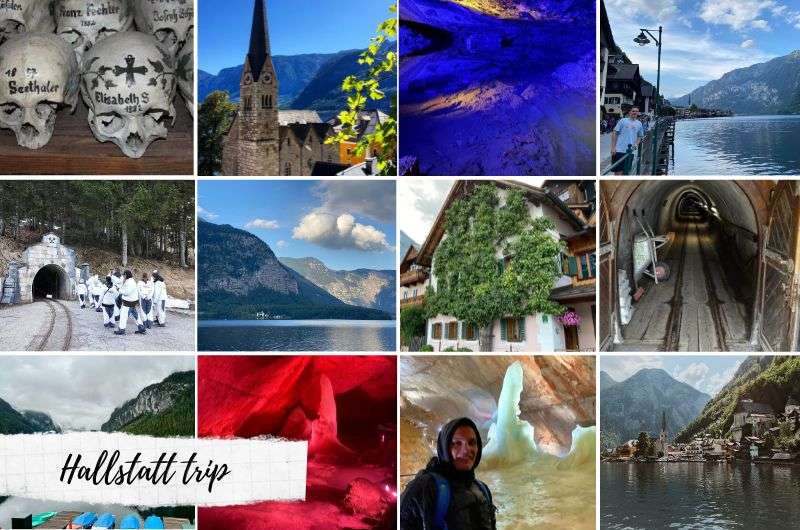
Planning a Hallstatt trip? Here's your cheat sheet—what to see, where to eat, and the best spots to wake up to those dreamy alpine views
This article covers the must-see places in Hallstatt—but if you're planning a real trip, here are some bonus tips (or, just hop over to my Hallstatt itinerary and let me do the work for you):
Where to eat in Hallstatt
Truth? Hallstatt is pretty and pricey, and most lakeside restaurants bank on the view more than the food. But if you are looking for the best bang for your buck, I found the Rudolfsturm Restaurant to be the top option (pun intended). The food is alright, the service might be slower sometimes, but the captivating views over the valley will make this an unforgettable experience.
Where to stay in Hallstatt
If you want early-morning views without busloads of tourists and have time to see the top attractions near Hallstatt as well, staying overnight in Hallstatt is definitely worth it.
I felt like I hit the jackpot when I booked my hotel, COOEE Alpin Hotel Dachstein, and wholeheartedly recommend it. It’s very Austrian still, but manages to keep its décor modern and not tacky (and that view!).
Within Hallstatt town, try Boutiquehotel Strand Hallstatt, right on the lake’s shore.
How to get to Hallstatt
-
Train: From Salzburg or Vienna, switch in Attnang-Puchheim. The Hallstatt train station is across the lake from the actual town, but hey, at least you get to take the ferry (yes, it's scenic).
-
Car: About 1 hr 15 min from Salzburg, 3.5 hrs from Vienna.
-
Parking: P1 and P2 are closest, but Hallstatt gets packed. Arrive early or prepare to circle like a touristy vulture.
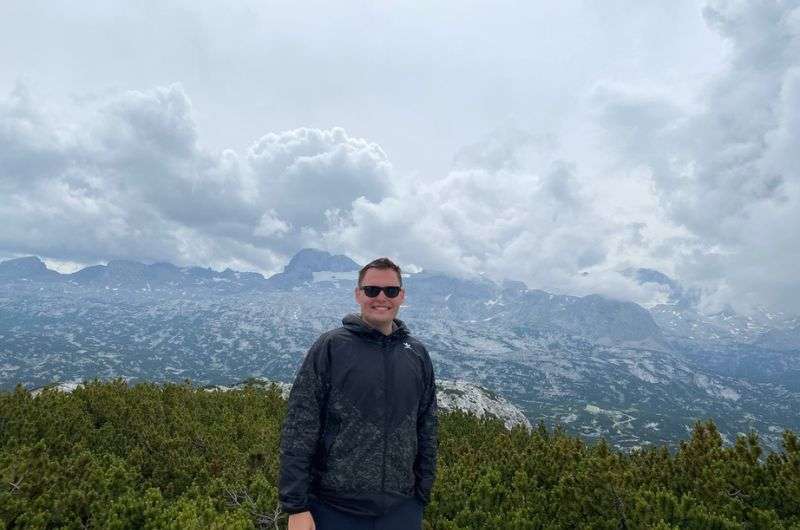
On top of the world—well, almost. 5 Fingers viewpoint delivers next-level views over the Dachstein Alps
Can you see Hallstatt in one day?
Yes, Hallstatt is doable in a day—if you stick to the must-sees within and closest to town. That's what this article is for. But if you have more time and want to explore the area more, I strongly encourage you to give yourself 2–3 days.

Sometimes, all you need to do is take the first step... I've filtered out the best hotels in Austria for you
Save it for yourself to come back to later, or share with your friends on social media!
You might also be interested in reading:
- A Detailed 10-Day Austria Itinerary
- 3 Days in Vienna: The Ultimate Itinerary
- What is Austria Known For? 13 Tips and Tricks for Your Vacation
- 9 Unusual Things to Do in Vienna
- 7 Top Tourist Cities in Austria: Highlights, Trips, Hotels, and More
This post contains affiliate links. If you make a booking through one of my links, I may earn a small commission, at no additional cost to you. Thank you for your support!




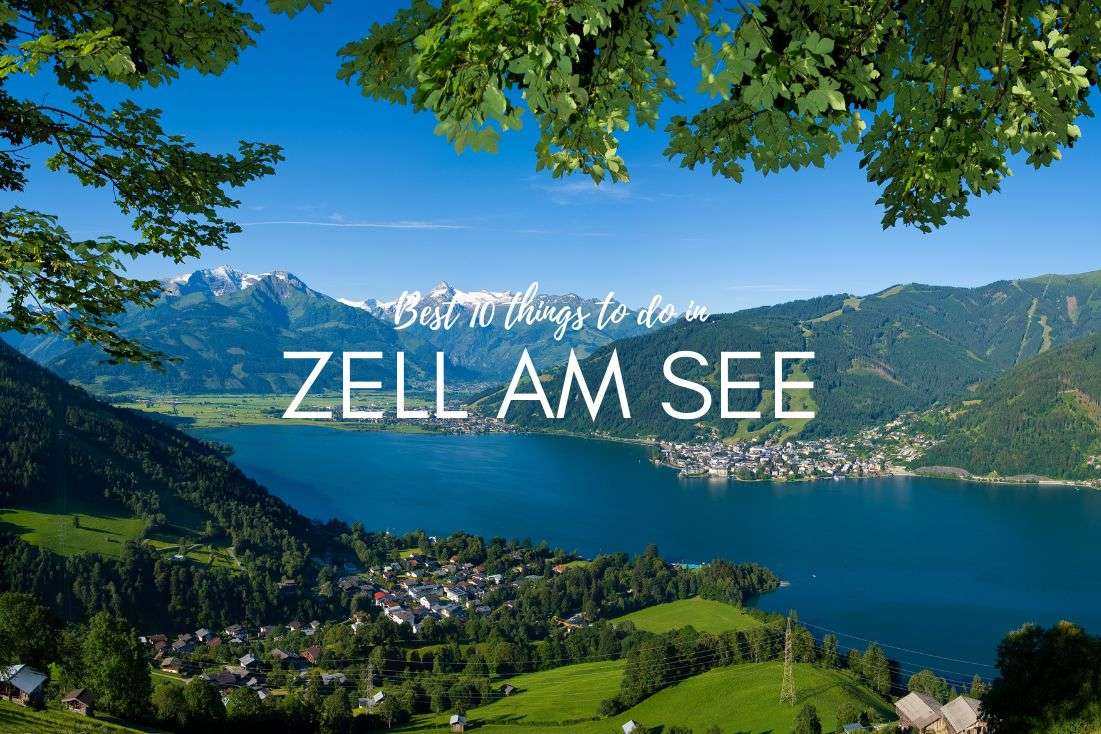
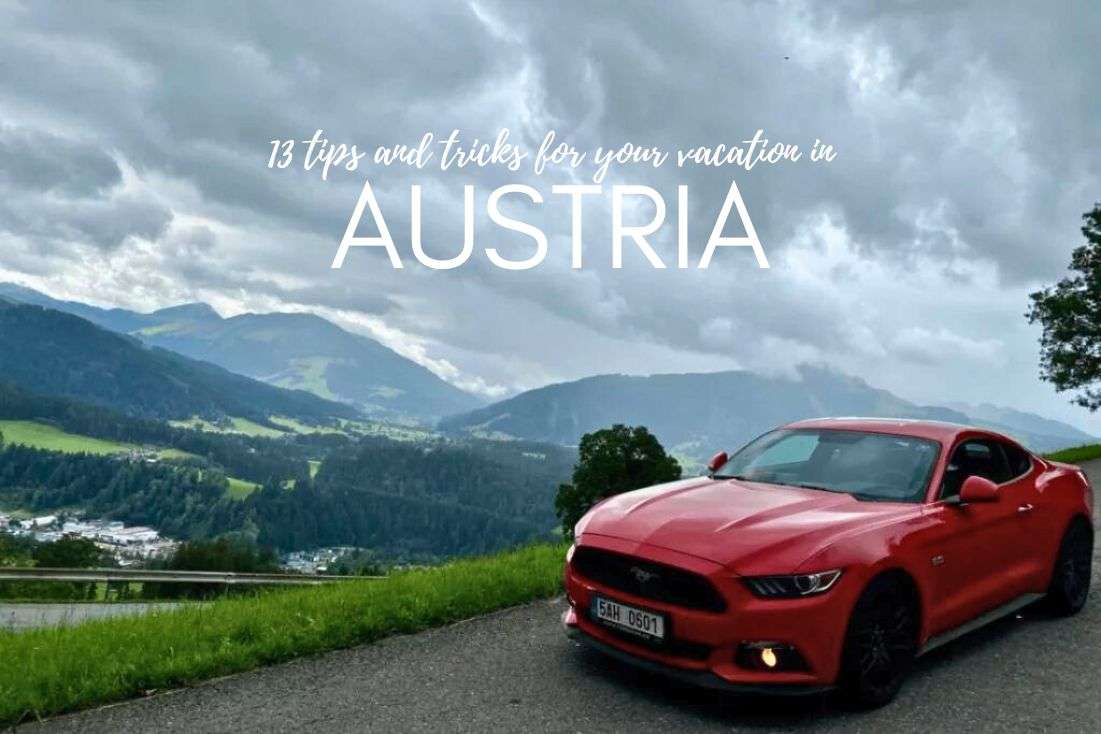
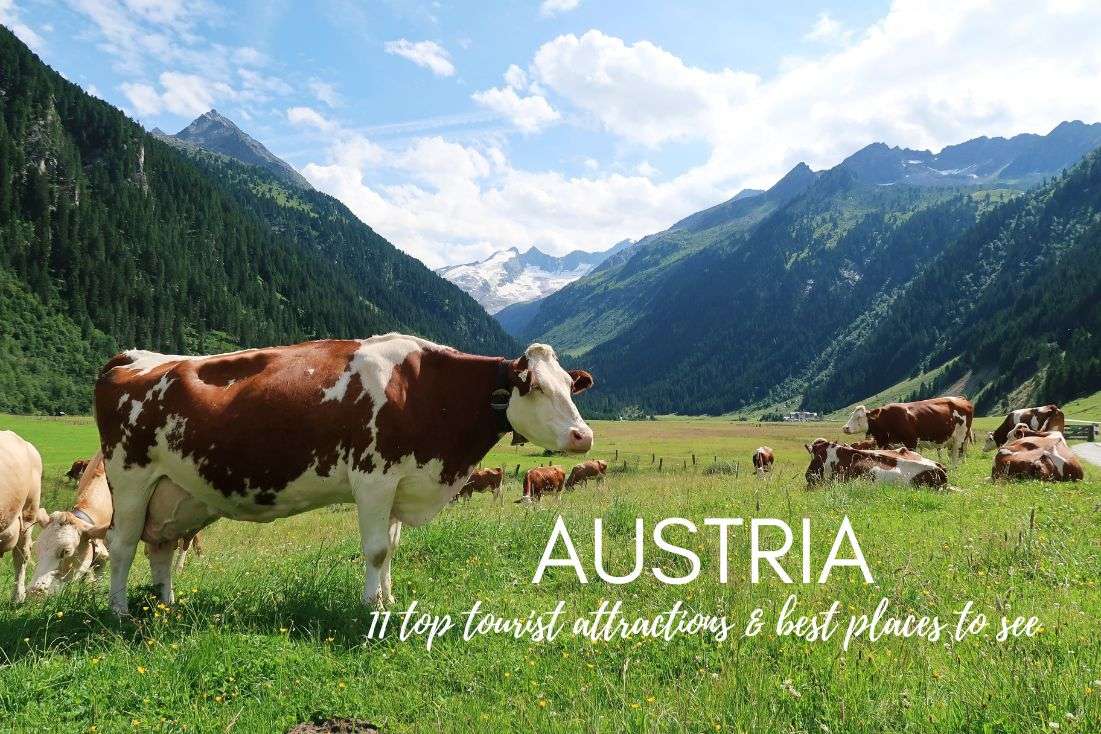



Comments | Thoughts? Give us a shout!